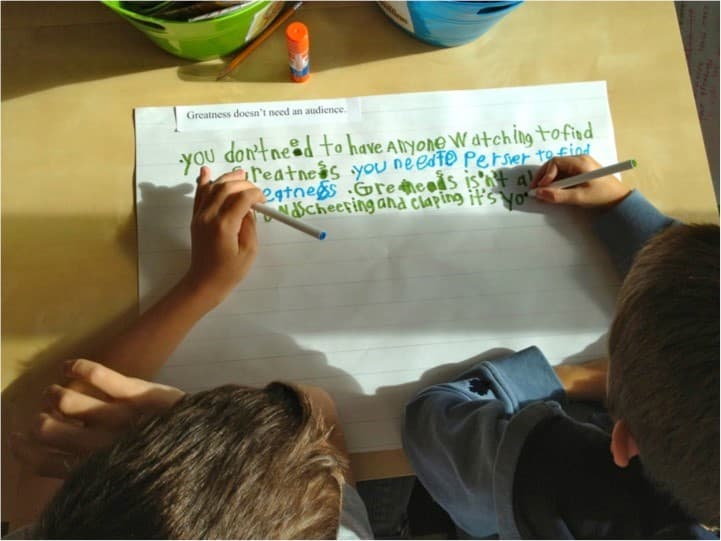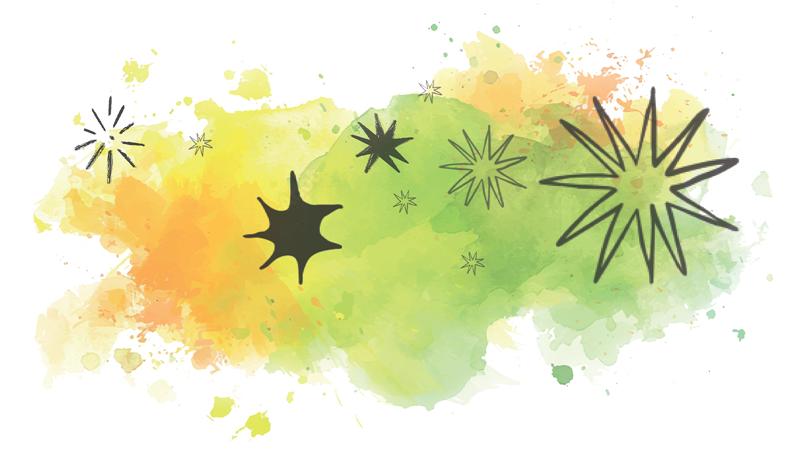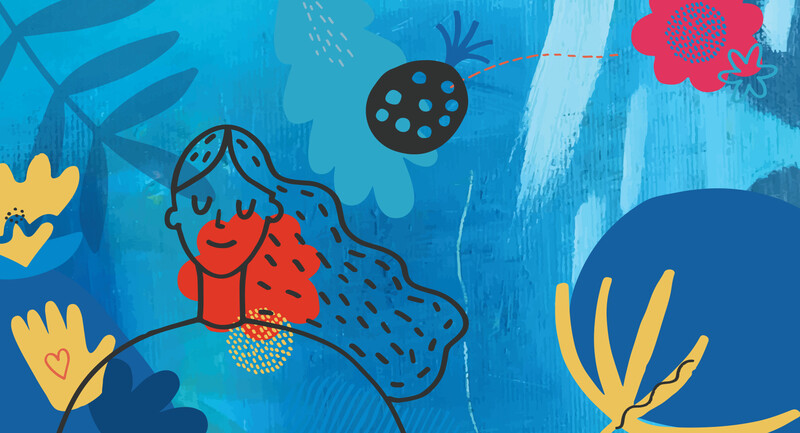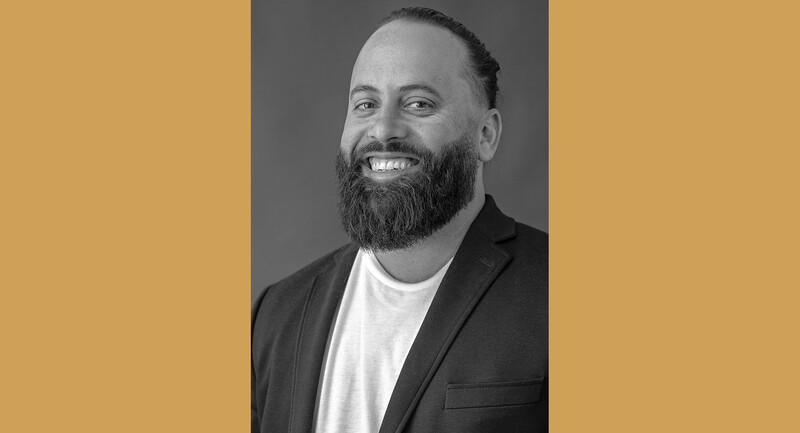Stuff doesn't last long on the walls of my classroom. Bulletin boards, student work, anchor charts. Nothing stays up much longer than our current classroom conversations. Which made it all the more curious that, at the end of the school year a few springs ago, one spot had managed to elude my busy fingers. Above the door of my 4th grade classroom were three little words that I had posted in September—Find Your Greatness.
I have always found it difficult to subscribe to the belief that there are good classes and bad classes when it comes to behavior management. To think this way reduces our impact as educators and essentially turns the possibility of having a productive year into a roll of the dice. Are some classes more difficult to manage? Absolutely. A classroom community doesn't just show up on the first day of school along with the glue sticks and boxes of Kleenex. But a community of learners isn't a natural phenomenon that we have no control over, either. It requires careful thought and planning. It requires a strategy. I often find myself spending more time thinking about crafting community during the first few weeks of school than anything else. Math and spelling can wait. Community building can't.
Training Wheels for Conversation
Back-to-school acrostic poems and essays on summer vacations have never been my thing. I've always used the first few days of a new school year to focus on where we plan to go, rather than on where we have been. A few years ago, I found inspiration in the Nike campaign "Find Your Greatness." The campaign had initially run during the 2012 Summer Olympics and continues to gather views on YouTube today. The ads consist of several vignettes of athletes, both children and adults, in a variety of sports. They feature very little dialogue. The message of each ad is presented by a voiceover offering a specific belief about "greatness." For example, in one ad, a child is pictured standing at the top of a diving tower. It is clear that he is hesitant about making the jump. We watch him shuffle uncertainly for a few moments and then the voiceover states, "Greatness is a scary thing. Until … it isn't." The ad concludes with the child making the leap into the water as the phrase "Find Your Greatness" appears on the screen.
The clips are short and snappy, making them ideal for classroom use. I knew they would be just the thing to catch my students' attention after the long lazy days of summer and provide rich opportunities for discussion and learning.
One of the cornerstones of a classroom community lies in students' ability to share, listen, and respond during group discussions. Like many of the expectations in my classroom, conversation (or "accountable talk") is a skill that requires explicit instruction and authentic opportunities in which to practice. That year, these ads became the training wheels for our first few conversations together, and I couldn't wait to hear what my students' beliefs about "greatness" would be.
Many students come to us with the mindset that learning is a competitive sport. That's really not surprising when the very nature of schooling, with its grades and percentages, seems designed for the sole purpose of ranking and ordering students. Also not surprising is the fact that the older my students are, the more entrenched this competitive mindset appears to be. Maybe this is why this particular ad campaign grabbed my attention. I loved the juxtaposition of building a cooperative community out of an ad campaign airing during the Olympics—the ultimate contest designed to separate winning from losing. Unfortunately, many of our students view learning this same way. Even as early as 4th grade, there are children who have already decided whether they are a "winner" or a "loser" at the game of school. I wanted my students to understand that winning and losing would have very little to do with the way we would be learning that year. We would need to have a shared vision of what our learning would look and sound like—and what it would not.
I remember anticipating what the students would say when asked what greatness meant. Would they, as the voiceover suggested, believe that greatness was only for a chosen few? The superstars? What preconceived ideas would they have around excellence? One particular student comment, made during our initial conversation, still stands out in my memory: "Second place is just the first-place loser." To be sure, I had heard this quote before. But to hear it uttered as fact from the mouth of a 9-year-old while other students nodded in agreement was a defining moment for me as an educator. How did we get here? More importantly, did my students actually believe winning was the only thing that mattered? This moment took place well before I had begun to hear about the power of a growth mindset. But even back then, I knew that learning as a competition was a belief system that simply could not exist if we were to build a community of learners together.
Beyond Bingo
Our exploration of greatness had begun. As a class, we watched the video clips. Then, in pairs and small groups, the students wrote shared personal responses to the messages presented in the ads. Some of the ad messages students selected were:
▪ "Greatness needs a lot of things. But it doesn't need an audience."
▪ "Is it speed or endurance? Does it happen in 2 hours or 4 or 6? Is it finishing strong or barely finishing? Yes."
▪ "Some people are told they were born with greatness. Some people tell themselves."
I listened as students bounced ideas off one another. After they completed their written responses, each pair and small group traveled around the room in a "gallery walk" to read and reflect on their peers' thinking. It was interesting to listen to their comments and watch clusters form around certain student responses. The students discussed, negotiated, clarified, and yes … sometimes respectfully disagreed. We then gathered as a class to summarize our noticings and share our developing understandings. We challenged one another on what we had come to believe about greatness. There were no right or wrong answers. No answer keys to consult. Our discussions were rich, thoughtful, and never long enough, if the groans when we stopped were anything to judge by!
Through these shared conversations, we got to know one another—authentically. We didn't need a game of Bingo to help us learn one another's names. We learned them by listening and responding to what others had to say. The fact that the students had shared their thinking enthusiastically was a good indicator that our community-building journey was off to a strong start.

Tracey Tinley's students participate in a partner-writing activity in response to one of the taglines from Nike's "Find Your Greatness" ad campaign. Photo courtesy of Tracey Tinley.
We viewed several ads over those first few weeks, each time with students responding in pairs and small groups, reflecting on the thoughts of others, and then engaging in a whole-class discussion. Students were paired strategically during this activity so they could work with a variety of classmates—of different genders, perspectives, and so on. From the beginning, I wanted my students to recognize all of the possible positive working relationships that were available to them.
Some of the partner responses were:
▪ "It's your strength and courage that makes you great. Greatness doesn't mean gold medals—it's you."
▪ "Sometimes greatness can feel scary because you might be afraid or embarrassed to make a mistake. You have to do it anyway."
▪ "You don't need an audience to practice what's inside your heart. It's not about the medals and the trophies."
These revised slogans went up on our walls to provide daily inspiration. Several times, I overheard students whisper parts of these phrases to one another. It wasn't uncommon to hear "do it anyway" or "greatness is a scary thing" when a student appeared nervous to share an idea or try something new. Their words also found their way into my classroom management repertoire. On one particular occasion, I had a student doing a little too much celebrating over a soccer goal during gym class. A quiet "greatness doesn't need an audience" was all it took to remind him to stop showboating and get back to work.
Toward the end of our study, we gathered the best parts of our thinking in a "popcorn poem" (a poem built collaboratively, with each line of the poem being offered by a student in a way that connects and builds onto the line shared by the preceding student). It was a piece of writing that left us all stunned by its power—and it belonged to all of us. We decided to share it with parents at our Classroom Showcase that October—not only to show off the rich thinking we had done, but also to give parents a preview of what we were striving to develop that year. My hope was that parents might connect to our shift in defining greatness. Perhaps they might begin to echo these sentiments at the hockey rink or on the soccer field. When report cards eventually did make their way home, they might appreciate the greatness that their child had achieved that term, even if it didn't present itself in the form of straight As.
A Much-Needed Message
That September, those three little words above our door were meant for my students. They were intended to remind them that every day is a new opportunity to become our best selves. I realize now that these words were a much-needed message for me as well. Being a teacher is hard work. Creating the conditions for a healthy classroom community can be that much harder. There were mornings where I'll admit I was tempted to pull these words down and replace them with "Find Your Pencil." As teachers, we need to believe in the greatness within ourselves just as much as we believe in it for our students. Too often we focus on our limitations—the marking we didn't get to, the student conferences we didn't have, the parent phone calls we didn't make. Finding and developing our classroom community takes time and patience. It takes a willingness to keep trying even when things get hard. It takes forgiveness for our students, but also for ourselves.
I learned a lot about greatness and community from my students that year. Greatness was when a group of students were willing to admit they needed extra help and stayed behind with me at the carpet after the lesson. Greatness was a student telling his mother that a poem was the best thing he ever wrote "even though it has some spelling mistakes in it." Greatness was the letter left to me by a substitute teacher telling me how kind and helpful the children were on a particular day. Greatness was an entire class cheering when a student scored a basket … in his team's own net. Greatness meant a lot of things in our classroom that year. But above all, it became a word that described our classroom community.
"Found Our Greatness"
I finally did reach up for those three little words, but I didn't take them down. On the last day of school, I got up on my chair and changed a few letters. It was a small change, but it represented a big shift in our learning that year. I remember thinking the students might not even notice the difference. They noticed. Immediately. The words above our door now read, "Found Our Greatness." As they ran toward me, eager to point out the change, I smiled and assured them that I had known they would find their greatness all along.






